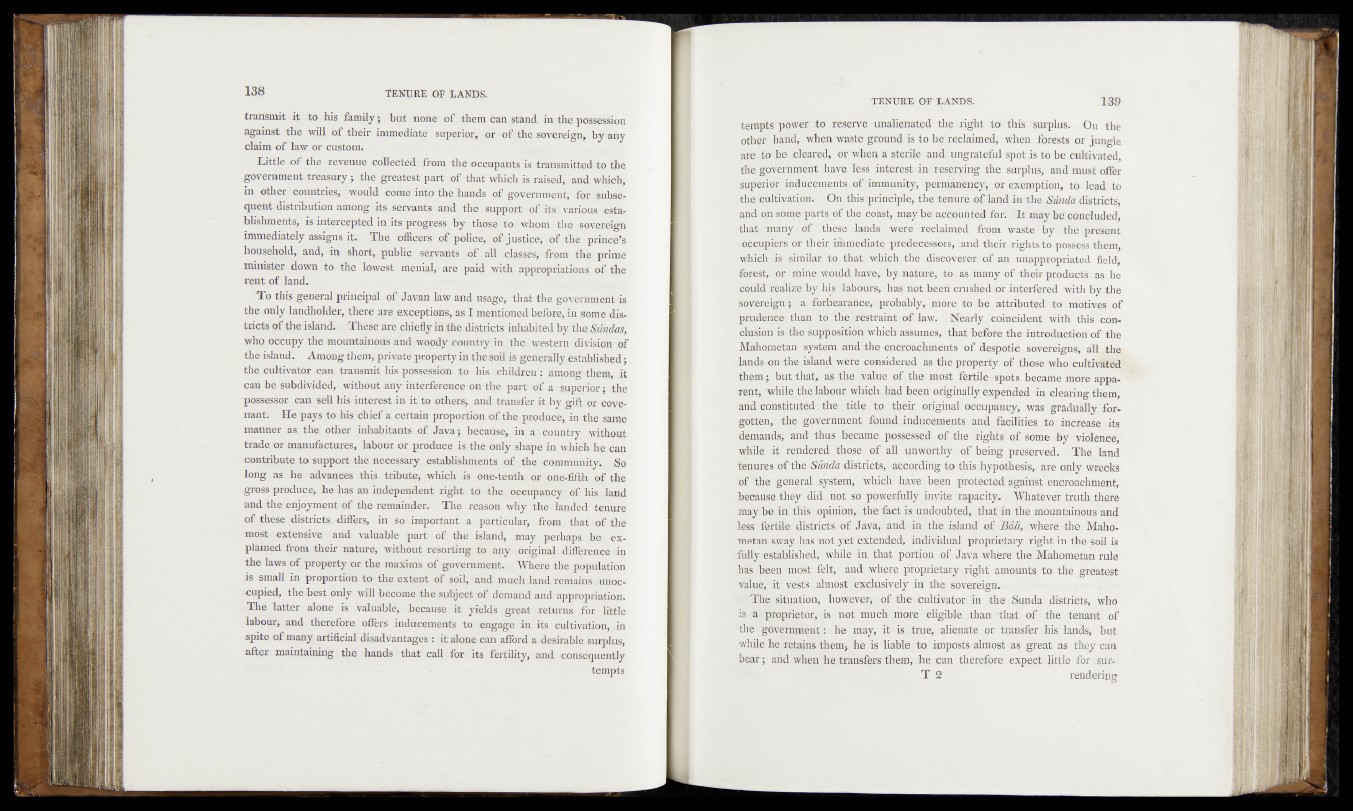
138 TENURE OF LANDS.
transmit it tó his family ! but none ©£ them can stand in the possession
against the will of their immediate superior, or of the sovereign, by any
claim of law or custom.
Kttle of the revenue collected from the occupants is transmitted "to the
government treasury ; .the greatest part of that which is raised, and -which,
m Other countries, -would come into the hands of government,' for subsequent
distribution among its servants and the support- ofifits various establishments,
is intercepted in its progress by those to whom the- sovereign
immediately assigns it. The officers of police, of justice, of the prince's
household, and, in short, public servants of all classes, from the prime
minister down to the lowest menial,- are paid with appropriations of the
rent of land.
■ T b to is general principal cff JaVan law and usage, -that the government is'
the only landholder, there axe exceptions,.as I mentioned before,, in scupae districts
of the island. These are chiefly in the districts inhabited by iheSiunckts,
who occupy the mountainous and woody oamxfcry in th e ' western division of
the island. Among them, private property in the soil is generally established4
the cultivator can transmit his possession to his children: among'them, it
can be ■subdivided, without any interference on the parfc of a superior; the
possessor can sell his interest in i t to others, and transfer it by gift, or :oove-
Wfit. He pays to his chief a certain proportion of the, produce, in the same
manner as the ©her Inhabitants of Java5 because, in a country, without
trade, nr manufactures, labour, or prodnce is the only shape.in which he can
contribute to«upfmrttkenecessary establishments of .the community. So
long as -be advances this tribute, which is one-tenth.or one-fifth of the
gross produce, -he has an independent right to toé,ocGupancycÏQf his. knd
and the enjoyment of the remainder. The reason why the landed- tenure
of these districts, .differs, hi so important a particular, from that the
most extensive and valuable part of the island, wiav perhaps
plained, from their nature, without resorting to any, original difference tin
the laws of property or the maxims of government. __ Where the population
is small in proportion, to the extent óf.soil,'and muchdandremains unoccupied,.
thé. best only will become the subject of demand and appropriation.
The latter, alone is valuable, because it yields . great returns: /or.-dirtle
labour, and therefore offers inducements to engage in its cultivation, in
$phie of many artificial disadvantages : it alone ean afford a desirable surplus,
a&er maintaining the hands that call. for its fertility, and consequently
■ ' 'iftMpIs
tempts power to reserve unalienated foe right to this' surplus. On the
other hand, when waste ground is to he reclaimed, when forests or' jungle
are to be cleared, ïbf-‘when a sterile and ungrateful spot is to be cultivated,
the government have -less interest in reserving the surplus, and must offer
Superior inducements of immunity, permanency, or exemption, I to, lead to
the cultivation. On this principle, the tenure Of land in-theriS'i^a districts,
and on.some parts of the coast, may be accounted for. Tt may be. concluded,
that many'-of these lands- were reclaimed ffonn.'wèite fey the present
-occupiers ór their imraediate'-predecessors, ..and their rightsto possess them,
which is ^similar to:; that; which the: discoverer of an unappropriated field;
forest,‘//ór. mine would,have,, hy nature, -to as many of their-products as hè
Could, realize by his labours, has* not been crushed or interfered with by the
sovereign; a forbearance, probably, more to be attributed, to motives of
prudence than to .thelr^traipt.of law. Nearly coincident- with this conclusion
is the-supposition which assumes, that before the introduction of .the
Mahometan system and foie- encroachments of despotio sovereigns, all Jbe
lands on1 fchg island were considered as the property of those who cultivated
them; but-foat, bs the value of. the most fertile --spots became more apparent,
while jhe, labour which had been originally expended in clearing them,
and constituted* the title. tp, theiryorigiual occupancy, was gradually forgotten,
the government found inducements and facilities to increase its
demands# and thus- became' possessed of foe rights of somè by violence,
while ,-ib rendered those of all unworthy.-of being preserved. The land
tenures of the Sunda districts, according to this hypothesis, are only wrecks
of the general: system, which' have been protected against encroachment,,
because they: did not so powerfully invite rapacity. Whatever truth* there
may be in this: opinion, the fact is undoubted, that in the mountainous: and
less fertile districfesvof Java,, and in the island .of SdU, where“ the Mahometan
sway has not yet extended, individual proprietary right in the soil is
fully established, while in that portion of - Java where the Mahometan rule
has been most felt, -and ïteböre proprietary right amounts* to the greatest
value, it vests, almost exclusively in toe.’ sovereign.1 <
• The situation* howévetjobf toe cultivator tiin; the Sunda districts, who
is a- pipprietor, is. not much ,more- eligible -than that of the- tenanfr of
thé 'government-:1 he-may, it isc true, alienate or transfer his'lands* but
while he retains them# -he is liable to imposts almost as great as they can
bear; and when hè transfers them, he can therefore expect littlë for sur-
{_• ',T 2 rendering